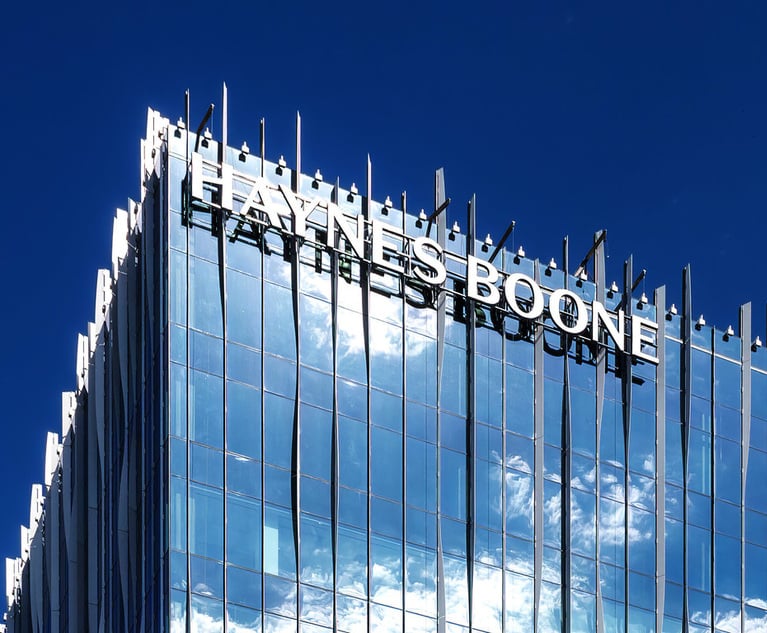 Texas Capitol building in Austin Texas. (Photo: Clayton Harrison/Shutterstock.com)
Texas Capitol building in Austin Texas. (Photo: Clayton Harrison/Shutterstock.com)What Attorneys Need to Know About 10 New Texas Laws That Will Change Legal Practice, Courts
Now is the time for a lawyer's work—arguing for how courts will interpret the laws, many of which directly impact the legal profession and the courts.
June 20, 2019 at 04:43 PM
5 minute read
The hustle and bustle of the 2019 legislative session is over as lawmakers have left the pink dome in Austin to scatter home across the Lone Star State, and Texas Gov. Greg Abbott has finished putting pen to paper to sign or veto new laws.
Now is the time for a lawyer's work—arguing for how courts will interpret the laws, many of which directly impact the legal profession and the courts.
For litigators, this means paying special attention to new laws that will change two types of motions to dismiss in state court, tweak evidence rules in personal injury and medical-malpractice cases and more.
For judges and elected prosecutors, it's likely a cause for celebration because of legislation giving them more than $30 million in pay raises for over the next two years.
Texas Lawyer watched bills move through the legislative process and heard from attorneys and judges who had first-row seats to the action. Here is a list of new laws of interest to attorneys and judges. Unless otherwise noted, the laws go into effect Sept. 1.
|Litigation Bills
Attorneys have filed anti-SLAPP motions to dismiss in many types of cases since the Texas Citizens Participation Act went into effect. HB 2730 would place strict limits on the use of this motion to dismiss so that it only applies to cases involving free speech, freedom of association or the right to petition the government.
Currently, defendants may file a motion to dismiss a claim that has no basis in law or fact. The prevailing party of the motion collects mandatory attorney fees from the losing party. HB 3300 changes the law to allow a judge the discretion to award attorney fees.
In current law, plaintiffs must submit medical expense affidavits to support that their doctor bills charged a reasonable amount and that they needed the treatment. HB 1693 changes the deadlines for plaintiffs to submit these affidavits, and for defendants to submit counter-affidavits.
Currently in medical malpractice cases against an emergency room or its doctors, plaintiffs must prove by a preponderance of the evidence that the defendants were willfully or wantonly negligent. HB 2362 makes five categories of med-mal case types exempt from this high standard of proof. The law aims to make the higher standard apply only to patients with emergency conditions who went to the emergency room for treatment, not people who go for follow-up or routine health care.
Under current law, a plaintiff who sues an architect, engineer, surveyor or landscape architect must file a certificate of merit from another licensed profession in that profession stating that the defendant's actions were malpractice. SB 1928, effective June 10, clarifies that any claimant—whether a plaintiff filing a lawsuit or a defendant raising a counterclaim—must file a certificate of merit. Also, the affiant in the certificate of merit must actually practice in the same profession as the defendant.
HB 2826 will impact attorneys who represent governmental agencies in litigation under contingent fee contracts. Before entering a contingent fee contract, the government agencies must follow the new law's requirements for selecting an attorney or firm, provide notice and a public meeting on the proposed contract, release certain findings in writing and get approval from the Texas Office of the Attorney General to approve the contract.
Attorneys and firms who advertise legal services for prescription drug, medical device and other health-related matters will face new limits under SB 1189. There are new disclosure requirements, prohibitions on using misleading or manipulative information, and even legal penalties for violators.
|
Judiciary Bills
HB 2384 commits more than $30 million over the next two years to raise the pay of judges across Texas, tying their salaries to their length of service. A judge would receive a 10% salary increase after four years of service, then again at eight years and 12 years. Prosecutors would benefit from the same pay increase structure. The law also impacts judges' and prosecutors' retirement benefits.
The state's current rules for expedited actions apply to cases worth less than $100,000, but SB 2342 expands the limit to $250,000. Most county courts-at-law currently can hear cases involving up to $100,000, but SB 2342, Sept. 1, 2020, expands the limit to $250,000. There are a smattering of county courts-at-law already with limits greater than $250,000, and the law requires them to seat 12-person juries rather than six for those higher-dollar cases. Justice of the peace courts will go from hearing $10,000 to $20,000 cases.
What the law does: HB 3233, effective June 2, changes campaign contribution limits for judges by making it clear that a candidate may accept a maximum contribution from an individual one time during the primary election season, and again if there's a runoff in the primaries, and yet again during the general election. Among other things, the bill limits the amount of money allowed by attorneys who contribute as a group within their law firm. It also removes some limits on judges' expenditures and campaign activities.
This content has been archived. It is available through our partners, LexisNexis® and Bloomberg Law.
To view this content, please continue to their sites.
Not a Lexis Subscriber?
Subscribe Now
Not a Bloomberg Law Subscriber?
Subscribe Now
NOT FOR REPRINT
© 2024 ALM Global, LLC, All Rights Reserved. Request academic re-use from www.copyright.com. All other uses, submit a request to [email protected]. For more information visit Asset & Logo Licensing.
You Might Like
View All
Advising 'Capital-Intensive Spaces' Fuels Corporate Practice Growth For Haynes and Boone
4 minute read
Homegrown Texas Law Firms Expanded Outside the Lone Star State in 2024 As Out-of-State Firms Moved In
5 minute read
Energy Lawyers Working in Texas Expect Strong Demand to Continue in 2025 Across Energy Sector
6 minute read
'So Many Firms' Have Yet to Announce Associate Bonuses, Underlining Big Law's Uneven Approach
5 minute readTrending Stories
Who Got The Work
Michael G. Bongiorno, Andrew Scott Dulberg and Elizabeth E. Driscoll from Wilmer Cutler Pickering Hale and Dorr have stepped in to represent Symbotic Inc., an A.I.-enabled technology platform that focuses on increasing supply chain efficiency, and other defendants in a pending shareholder derivative lawsuit. The case, filed Oct. 2 in Massachusetts District Court by the Brown Law Firm on behalf of Stephen Austen, accuses certain officers and directors of misleading investors in regard to Symbotic's potential for margin growth by failing to disclose that the company was not equipped to timely deploy its systems or manage expenses through project delays. The case, assigned to U.S. District Judge Nathaniel M. Gorton, is 1:24-cv-12522, Austen v. Cohen et al.
Who Got The Work
Edmund Polubinski and Marie Killmond of Davis Polk & Wardwell have entered appearances for data platform software development company MongoDB and other defendants in a pending shareholder derivative lawsuit. The action, filed Oct. 7 in New York Southern District Court by the Brown Law Firm, accuses the company's directors and/or officers of falsely expressing confidence in the company’s restructuring of its sales incentive plan and downplaying the severity of decreases in its upfront commitments. The case is 1:24-cv-07594, Roy v. Ittycheria et al.
Who Got The Work
Amy O. Bruchs and Kurt F. Ellison of Michael Best & Friedrich have entered appearances for Epic Systems Corp. in a pending employment discrimination lawsuit. The suit was filed Sept. 7 in Wisconsin Western District Court by Levine Eisberner LLC and Siri & Glimstad on behalf of a project manager who claims that he was wrongfully terminated after applying for a religious exemption to the defendant's COVID-19 vaccine mandate. The case, assigned to U.S. Magistrate Judge Anita Marie Boor, is 3:24-cv-00630, Secker, Nathan v. Epic Systems Corporation.
Who Got The Work
David X. Sullivan, Thomas J. Finn and Gregory A. Hall from McCarter & English have entered appearances for Sunrun Installation Services in a pending civil rights lawsuit. The complaint was filed Sept. 4 in Connecticut District Court by attorney Robert M. Berke on behalf of former employee George Edward Steins, who was arrested and charged with employing an unregistered home improvement salesperson. The complaint alleges that had Sunrun informed the Connecticut Department of Consumer Protection that the plaintiff's employment had ended in 2017 and that he no longer held Sunrun's home improvement contractor license, he would not have been hit with charges, which were dismissed in May 2024. The case, assigned to U.S. District Judge Jeffrey A. Meyer, is 3:24-cv-01423, Steins v. Sunrun, Inc. et al.
Who Got The Work
Greenberg Traurig shareholder Joshua L. Raskin has entered an appearance for boohoo.com UK Ltd. in a pending patent infringement lawsuit. The suit, filed Sept. 3 in Texas Eastern District Court by Rozier Hardt McDonough on behalf of Alto Dynamics, asserts five patents related to an online shopping platform. The case, assigned to U.S. District Judge Rodney Gilstrap, is 2:24-cv-00719, Alto Dynamics, LLC v. boohoo.com UK Limited.
Featured Firms
Law Offices of Gary Martin Hays & Associates, P.C.
(470) 294-1674
Law Offices of Mark E. Salomone
(857) 444-6468
Smith & Hassler
(713) 739-1250






